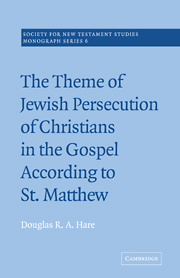Book contents
- Frontmatter
- Contents
- Preface
- List of abbreviations
- I General Remarks on the Nature of the Conflict between Jews and Christians
- II Survey of the Data of Jewish Persecution of Christians in Sources other than Matthew
- III References to Jewish Persecution of Christians in the Gospel according to St Matthew
- IV Matthew's Understanding of the Causes of Persecution
- V The Christian Response to Persecution by the Jews as Evidenced by Matthew
- VI Summary and Conclusions
- Appendices
- Bibliography
- Indices
II - Survey of the Data of Jewish Persecution of Christians in Sources other than Matthew
Published online by Cambridge University Press: 25 February 2010
- Frontmatter
- Contents
- Preface
- List of abbreviations
- I General Remarks on the Nature of the Conflict between Jews and Christians
- II Survey of the Data of Jewish Persecution of Christians in Sources other than Matthew
- III References to Jewish Persecution of Christians in the Gospel according to St Matthew
- IV Matthew's Understanding of the Causes of Persecution
- V The Christian Response to Persecution by the Jews as Evidenced by Matthew
- VI Summary and Conclusions
- Appendices
- Bibliography
- Indices
Summary
In order to evaluate adequately the role played by the persecution theme in Matthew, it will be necessary to make a survey of the data of Jewish persecution of Christians in other sources, both Christian and non-Christian. That outbursts of violent opposition to the new religion did at times occur in Jewry seems certain. What is not at all certain is the nature and extent of this hostile reaction. It has been suggested that Christian authors have greatly exaggerated the amount of persecution suffered by Christians at the hands of the Jews. This is a possibility to be reckoned with. It is not at all uncommon for religious minorities who challenge a majority religion to regard any restrictions placed upon them by the community as a whole as ‘persecution’. We must therefore be cautious in assessing the witness of Christian authors to Jewish persecution.
Apart from Christian writings, however, our sources on the subject are extremely scanty. While the New Testament writings themselves fail to give us anything approaching an adequate historical report, the rabbinic sources are even less helpful. On a priori grounds, however, it is to be expected that the plaintiffs will be more explicit than the defendants. The historical accuracy of the charges made by the former can to some extent be checked by reference to the literature of the defendants, in which the problem of nonconformity is occasionally discussed. The underlying thesis of this chapter is that references in rabbinic and other Jewish literature to religious non-conformists, while they do not all allude to Jewish Christians, provide us with reliable evidence concerning the treatment of Christians by the Jewish community.
- Type
- Chapter
- Information
- Publisher: Cambridge University PressPrint publication year: 1967



